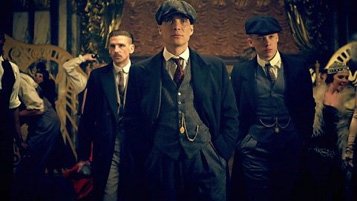Bernie Langs

It isn’t often that a television series completely engages me, and I am able to watch entire seasons without losing interest. Peaky Blinders comes to Netflix from the BBC and centers on a gangster family with their many schemes and adventures in post-World War I Birmingham, England. I’ve watched the first two seasons and am half-way through the third and most current season. The show has been renewed for two more years.
Peaky Blinders focuses on the three brothers and a sister of the Shelby family, their aunt and her recently discovered teenage son, and various other characters, such as an Irish Major trying to stop the family’s efforts, but later secretly recruits them for business in service of the Crown. There are times of graphic and disturbing violence portrayed on the show, that is often cringe-worthy. What makes this first-rate television is that the characters have complex personalities and are portrayed by a cast of actors that display incredible depth. In addition, the show utilizes loud, in-your-face contemporary rock music at times, that lends an acoustic parallel to the physical violence or the inner torments of the tortured souls being depicted. Peaky Blinders boasts beautiful sets and the cinematography and direction is full-length film worthy.
The Shelby family is led by Tommy, a decorated World War I veteran played by Cillian Murphy. For the first two seasons he was hounded by Major Chester Campbell, portrayed with vehemence by Sam Neill. Their chess match, even the one that took place when Shelby and Campbell were allies, was a wonder to watch unfold. Murphy’s Tommy Shelby has multiple layers of personality conflicts as he tries, mostly in vain, to take the ever-growing success and wealth of the family into legitimacy, echoing Al Pacino’s Godfather lament “They keep drawing me back!” Murphy is sometimes shown onscreen for long periods where he is thinking or staring someone down. The viewer is taken deep inside his psyche and the actor displays an uncanny and frightening ability to show a man shutting down any sense of human emotion or decency when it is necessary. Series creator, Steven Knight, makes use of Murphy’s rich eye color to allow us to see inside his very soul.
The rest of the cast play their roles with equal depth. Tommy’s elder brother, Arthur, portrayed by Paul Anderson, provides many of the show’s most violent outbursts. Yet his moments of silent suffering and intense inner turmoil make what could have been a clichéd role into a memorable characterization of a shell-shocked veteran who is both out-of-control yet fully self-aware and thus in the throes of a deep-set, unique suffering. Annabelle Wallis plays Grace Burgess, recruited by the love-struck Major Campbell to go undercover to infiltrate the Shelby gang and whom subsequently falls hard in love with Tommy. She too could have been written in standard television language, but the actress exploits her beauty as a tool for displays of complex emotions in the face of conflict and ruinous life decisions.
The final episode of season two was one of the best written dramatic television shows I’ve ever seen. Taking place in 1922 at the Epsom racecourse, Tommy Shelby has timed a Winston Churchill and Major Campbell-sanctioned political murder down to the second, and as things go wrong and he has to adjust his playbook, the viewer is riveted by the fast on screen action. Various characters that have appeared on the show come together beautifully during this climactic play of circumstance.
The complexities of the Shelby clan as gangsters reminds me of HBO’s The Sopranos. James Gandolfini’s acting as crime boss Tony Soprano was awe-inspiring. There was so much to Tony’s character that it was riveting to just watch him fidget with his pasta with a fork. The violence on that show was also unheard of at the time for a television series and much of Peaky Blinder’s harshness is in a similar manner. Gandolfini’s character was always on the verge of seeing himself for what he was, but he never could quite reach that moment of realizing the monster within. Late in the series, his long-time psychiatrist cuts him loose, unable, she tells him, to treat him since he is a sociopath. There was also a fantastic scene where Tony takes a hallucinatory drug and when viewing a beautiful landscape yells out in a Eureka fit of joy, “I get it!” But the thing is, he never did.
Cillian Murphy’s Tommy Shelby “gets it” however and is at war with himself about what he must do to maintain his family’s businesses and integrity as he strives for legitimacy. He won’t deny his inner violence in that pursuit. Even the slow-witted Arthur gets it more than he wants to and chooses to altruistically kill at times to spare his beloved brother Tommy from having to do so.
Smaller roles in Peaky Blinders include one played by the great actor Tom Hardy as the leader of a Jewish gangster clan. Hardy steals his scenes with his fast-talking and scheming and his own brand of violence. Those of us who have marveled at Hardy’s movie career can only imagine the joy he is taking, in being part of this terrific television ensemble. It is also amusing that he appeared with Murphy in the heady film Inception. The press has made much of the fact that the late rock star David Bowie contacted the show’s creator towards the end of his life, offering his music for inclusion in the soundtrack. Those of us who are fans of this great series are in excellent company.
